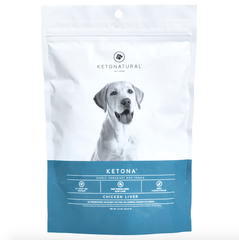Save Money, Save Your Dog.
Join Our Email List For Discounted Pricing and a Free Guide to the Science of Keto Dog Food.
As pet parents, learning what factors into our pet's health can feel overwhelming, and there's a lot of conflicting information out there. However, one of the easiest things we can do to keep our pets happy and healthy is to ensure they remain at an optimal weight.
While some dogs may have conditions like hypothyroidism that make it difficult for you to manage their weight without medical intervention, most dogs can maintain a healthy weight with proper diet and exercise. But with so many food options on the market, it can be challenging to know which food is best at causing weight loss and preventing obesity.
One of the easiest ways to assess whether or not your dog’s food could be contributing to their weight problem is to look for ingredients containing carbohydrates. While many pet parents believe that carbs are a necessary component of a dog’s diet, science and research actually says otherwise. Continue reading to learn more about whether or not dogs need carbs to survive.
5 Common Misconceptions About Whether or Not Dogs Need Carbs
If you’re buying store-bought dog food, there’s a high likelihood that your dog is eating a lot of carbs. This is because many filler ingredients found in dog food, like rice or sweet potatoes, contain carbs. Even high-quality or premium dog foods typically contain loads of carbs.
But in reality, our dogs don’t need carbs, and adding these ingredients is one of the primary contributors to the canine obesity epidemic. Consider the following five common misconceptions about whether or not dogs need carbs to understand better how reducing your dog’s carbohydrate intake might help them lose weight.
1. Carbs Can’t Be Unhealthy Because Dogs Have Evolved to Digest Carbs
One of the primary genetic differences between dogs and wolves is that dogs can digest carbohydrates effectively and wolves cannot. This is because only dogs produce amylase, an enzyme that helps convert carbs into glucose.
However, the misconception lies in the fact that just because dogs can digest carbs doesn't mean they should. Think of it like your own nutrition. Sure, your body can digest jelly donuts effectively, but that doesn’t mean that they’re good for you.
2. Dogs Need Carbohydrates for Energy
This misconception surrounds the idea that if your dog is going to be active, it needs extra carbs for energy. But this is assuming that a dog's metabolic functions are the same as a human's, which they aren't.
Dogs burn fat for fuel very effectively, much more effectively than people do. So as long as they don’t eat loads of carbohydrates, that’s exactly what their bodies will do. And with fat, a little goes a long way. Even the leanest dog has enough fat in its body to power far more activity than a house pet will ever be asked to perform. Carbohydrate intake in no way limits the amount of energy a dog can exert.
3. Dogs Need Carbohydrates for Glucose
Glucose is necessary for brain function, so many pet owners believe it's essential to feed their dogs enough carbohydrates to be converted to glucose to ensure their brains can function at optimum levels.
In reality, however, even if you feed your dog a low-carb dog food, they'll have more than enough glucose to ensure their brain is functioning normally. Their bodies constantly produce glucose from other nutritional substrates, primarily proteins via a process called “gluconeogenesis.”
4. Vet-Prescribed Dog Foods Contain Carbs, so They Can't Be Bad for My Dog
While it's true that many vet-prescribed dog foods contain carbs, this is more of an unfortunate reality than an endorsement for carbs. The simple truth is that the dog food industry has effectively misled the veterinary community into including a high level of carbs in prescription dog foods. Even, shockingly, in foods that are prescribed for dogs with diabetes!
5. Grain-Free Dog Foods Have Fewer Carbs
The final common misconception about carbs is that if you're buying grain-free food, there is a higher likelihood that it's a low-carb formula. This follows the logic that grains contain carbs, so if there are fewer grains, there are fewer carbs.
However, most grain-free dog foods still contain loads of carbohydrates—they just don't come from grains. Instead,they come from non-grain crops like potatoes and sweet potatoes. This means that a grain-free diet can still directly lead to obesity.
Switch Your Dog to a Ketogenic Diet Today
Did you know there's an alternative to high-carbohydrate dog foods? Ketona is a high-protein kibble product with 80% less carbohydrate than other premium brands.
For more information on the topic of whether or not dogs need carbs, you can listen to our two-part podcast episode about how carbs relate to canine obesity on Spotify under: " Carbs Make Dogs Fat: The Evidence” and " Do Dogs Need Carbs? The Evidence.”


Related Articles
How to Use Raw Bones for Dental Health Instead of Dental Chews
12 Warning Signs Your Dog is in Pain and How to Help
6 Signs Your Dog Needs Joint & Mobility Supplements
How to Spot When Your Senior Dog is in Pain
Browse Articles By Category